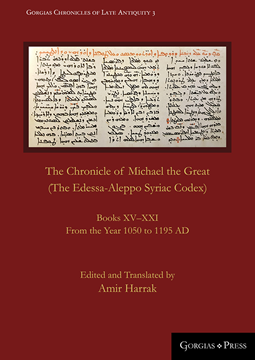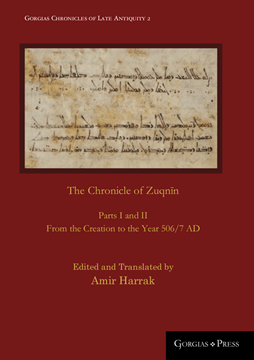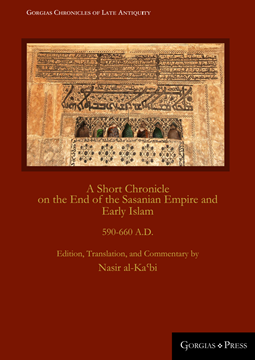Gorgias Chronicles of Late Antiquity
Gorgias Chronicles of Late Antiquity aims to publish Syriac and Christian Arabic chronicles dating between the 6th and the 14th centuries in their original languages and with facing English translations. The translations will make these unique chronographic sources accessible to as wide an audience as possible, offering the specialist the opportunity to read them in the original languages and to compare them with the translations.
Series Editor: Muriel Debié
The Chronicle of Michael the Great (The Edessa-Aleppo Syriac Codex)
Books XV–XXI. From the Year 1050 to 1195 AD
Edited and Translated by Amir Harrak
Series: Gorgias Chronicles of Late Antiquity 3
ISBN: 978-1-4632-4031-8
Michael the Great was elected patriarch of the Syriac Orthodox church in a most instable period. He nevertheless, found time, clarity of mind, and determination to write a voluminous world chronicle, which he completed four years before he died in November 7, 1199. The present edition and its translation begin with Book XV and end with Book XXI, the last Book in the Chronicle, thereby covering more than 160 years, from AD 1031 to AD 1195.
$215.00 (USD) $129.00 (USD)
The Chronicle of Zuqnīn
Parts I and II. From the Creation to the Year 506/7 AD
Edited and Translated by Amir Harrak
Series: Gorgias Chronicles of Late Antiquity 2
ISBN: 978-1-4632-0663-5
The Chronicle of Zuqnin is a universal history beginning with the Creation according to the biblical account and ending with the time of the Chronicler, the years 775-776 AD. The author is most probably Joshua the Stylite, a contemporary of the Caliphs al-Mansur and al-Mahdi, who lived in the monastery of Zuqnin that was located near Amid, the Diar-Bakr of modern Turkey. Parts I and II contain compiled sources some of which survived only in this Chronicle. Sources include the Bible, Cave of Treasures, the Sleepers of Ephesus, Eusebius of Caesarea, Socrates, and the short Chronicle called Pseudo-Joshua the Stylite that deals with Sassanian-Byzantine warfare at the begging of the 6th century. Parts III and IV cover the years 488 and 775 AD. In this volume, Parts I and II, including the author’s dedicatory letter, are now published in an updated edition of the Syriac text and the first English translation.
$215.00 (USD) $129.00 (USD)
A Short Chronicle on the End of the Sasanian Empire and Early Islam
590-660 A.D.
Edited and Translated by Nasir al-Ka'bi
Series: Gorgias Chronicles of Late Antiquity 1
ISBN: 978-1-4632-0563-8
The Short Chronicle is an eyewitness report on the demise of the Sasanian and Byzantines Empires and the beginning of the Islamic period. It uses official Sasanian sources and Syriac church documents and mentions for the first time new Arab cities, including Mosul, Kufa, and Baṣra.
$161.00 (USD) $96.60 (USD)



